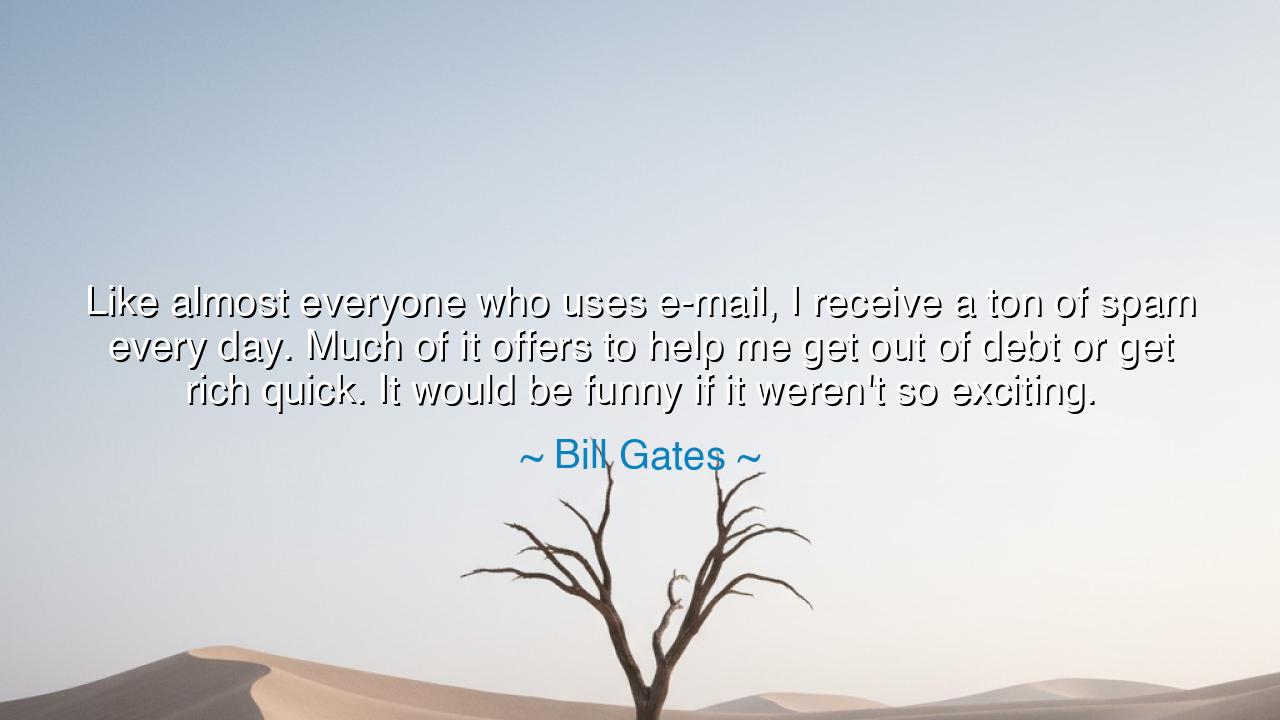
Like almost everyone who uses e-mail, I receive a ton of spam
Like almost everyone who uses e-mail, I receive a ton of spam every day. Much of it offers to help me get out of debt or get rich quick. It would be funny if it weren't so exciting.






“Like almost everyone who uses e-mail, I receive a ton of spam every day. Much of it offers to help me get out of debt or get rich quick. It would be funny if it weren’t so exciting.” — thus spoke Bill Gates, the architect of the digital age, whose creation opened the doors of communication to all the world. In these words, delivered with quiet wit, lies a reflection both humorous and profound — a commentary not merely on the clutter of modern life, but on the temptations that follow human progress wherever it goes. Beneath the jest, there lingers a truth the ancients would have known well: that every great invention, every new power, brings with it a shadow — the misuse of that power by those who prey upon the human desire for wealth, escape, and ease.
When Gates says that the endless flow of spam “would be funny if it weren’t so exciting,” he reveals the paradox of our time. These false promises, so absurd to reason, still touch something deep and restless in the human heart — the hunger for more. The ancients warned against this same folly. In the marketplaces of Athens, silver-tongued merchants promised quick fortunes and painless cures. In Rome, charlatans sold miracles in bottles, claiming divine favor for a price. And even earlier, in the myths of humankind, it was always the yearning for sudden gain — the golden apple, the forbidden fruit, the wish-granting charm — that led mortals astray. Thus, though technology has evolved, human nature remains the same: drawn toward the glittering illusion of an easy road.
The tone of Gates’s reflection is both ironic and compassionate. He does not condemn those who fall for such tricks; instead, he sees in their eagerness a reflection of a universal truth. The desire to escape debt, to gain wealth, to find freedom — these are not evils in themselves. They are the echoes of humanity’s ancient struggle for survival and dignity. But when those desires are untethered from wisdom, they become the very chains that bind us. The spam of the digital world, promising salvation through deceit, mirrors the false prophets of old, who offered heaven for a coin. It is the same story told anew, in the language of the inbox rather than the temple square.
In saying that it “would be funny if it weren’t so exciting,” Gates captures the delicate balance between amusement and alarm. There is comedy in the absurdity of the spammer’s promises — riches in a click, love in a message, enlightenment in a link. Yet there is tragedy too, for millions are drawn into these illusions, their hope manipulated by clever hands. The ancients might have seen this as a modern form of the Sirens’ song, whose melody lured sailors to ruin. It is the eternal danger of humankind: to mistake the voice of flattery for the voice of truth.
Consider the story of King Midas, who prayed that everything he touched would turn to gold. The gods granted his wish — and he starved amid his treasures. The “get rich quick” schemes that fill our inboxes are the same illusion reborn. They promise wealth without labor, gain without virtue, fulfillment without sacrifice. And yet, as Midas learned, blessings that come too easily often become curses. Gates, in his wry observation, stands as the modern sage reminding us that wisdom lies not in what glitters, but in what endures.
The deeper lesson of this quote lies not merely in laughter at folly, but in self-awareness. For even the wise are not immune to temptation. Gates himself, a man of vision and vast wealth, admits the “excitement” that stirs when such promises arrive. The danger of delusion, then, is not confined to the ignorant or the desperate — it is woven into the human condition. The ancients called this the trickster spirit, ever at work in the world, testing our discernment. It appears in many forms — a serpent in a garden, a false oracle, a digital message promising salvation. The task of the wise is not to escape such tests, but to recognize them for what they are.
So let this teaching be passed down: Guard your mind as you would your treasure. In every age, there are voices that promise you ease without effort, fortune without merit, knowledge without humility. Resist them, for they flatter only to deceive. Seek instead the quiet path of patience and discernment. Laugh at the absurdities of the world, yes, but never forget the longing they reveal within you. And when the next message arrives — the promise of quick wealth, instant fame, or effortless escape — remember the wisdom of both ancients and moderns: that nothing lasting is gained without work, and that true riches come not from what you are offered, but from what you earn.






AAdministratorAdministrator
Welcome, honored guests. Please leave a comment, we will respond soon